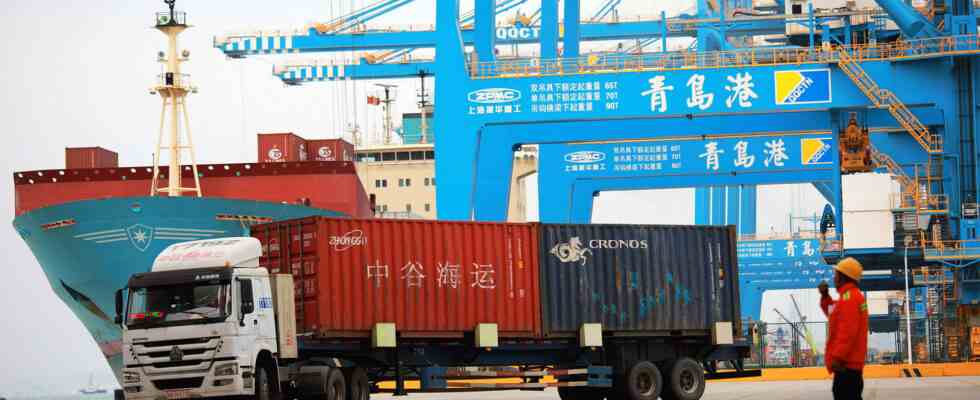analysis
Status: 03/06/2023 3:59 p.m
China narrowed its growth target for 2023. Experts warn that the People’s Republic is facing an economic decline – with drastic consequences for the global economy.
The global economic engine China is sputtering – even the Chinese leadership has had to admit that. At the start of the annual meeting of the National People’s Congress in Beijing, the outgoing Chinese Prime Minister Li Keqiang announced that the aim was to increase gross domestic product (GDP) by around five percent this year.
Experts no longer have much faith in China
The stock markets reacted with disappointment to this growth target, which was perceived as unambitious. Commerzbank expert Tommy Wu spoke of a “rather modest” goal, especially since the Chinese economy had already grown by only three percent in 2022 – and thus clearly missed last year’s growth target of 5.5 percent.
Wu expects the country’s growth momentum to slow in the second half of the year into next year. For 2024, like the economists of the OECD, he forecasts a GDP increase of only 4.9 percent, which is far below China’s ten-year historical growth rate of 7.9 percent per year.
Deep demographic crisis
Experts warn that the times of historically high growth rates in China are now finally over. The country is facing a drastic economic decline. The rigorous and ultimately failed corona policy of the political leadership is only one factor.
In the medium to long term, it is above all the combination of the real estate and demographic crisis that is giving the People’s Republic a hard time and will also dampen growth in the years and decades to come. After all, the rapidly growing population was the basis of China’s economic success for decades.
But this basis is crumbling enormously: the population of the huge empire is shrinking much faster than expected. The declining fertility of the population has dramatic consequences: in 2050 the Chinese could make up only 11 percent of the world population. For comparison: Today it is a good 18 percent.
Halving the population by 2100?
Despite China moving to a two-child policy in 2016, the number of births recently reached 9.56 million, its lowest level since 1790, Chinese demographics expert Yi Fuxian of the University of Wisconsin-Madison calculates in an op-ed for the “Neue Zürcher Zeitung”.
According to the latest United Nations (UN) world population projections, China’s population will shrink to 767 million by 2100. That means compared to today – China had an estimated 1.426 billion inhabitants in 2022 – almost a halving.
When will the real estate bubble burst?
In the medium to long term, the demographic crisis will also have a lasting impact on the real estate market. China is already sliding from one real estate crisis to the next. In autumn 2021, the insolvency of the Chinese real estate group Evergrande caused upheaval. A “Lehman shock” for the global financial markets has not materialized, but it seems as if this danger has been postponed rather than eliminated.
China expert Yi Fuxian is convinced that “if the bubble bursts, growth in China’s economy will slow down, and this in turn will result in a global financial crisis.”
World economy extremely dependent on China
If the Chinese engine sputters, it will have severe consequences for the global economy. After all, no country in the world has a larger share of the global economic output adjusted for purchasing power. In 2021, this proportion was a proud 18.6 percent. It is forecast to rise to 19.9 percent by 2027. In other words, the global economy is more dependent on China than on any other country.
A slowdown in China’s growth therefore also has dramatic consequences for the global economy. Especially since China is not only the largest export nation, but also the second largest importer after the USA. Long-term lower growth rates in China would therefore also hit the export nation Germany with all its machine builders and car companies hard.
Falling demand should depress oil prices
In the meantime, falling demand from China would have a strong price-reducing effect on the raw materials market, which should be particularly noticeable in the oil price, for example. After all, the second largest economy in the world is one of the largest consumers of energy.
A lower oil price would dampen global inflationary risks. However, lower growth in the People’s Republic may also have a driving effect on consumer prices.
Rising consumer prices ahead?
If less is produced in China, the goods and primary products required worldwide must be produced elsewhere. As a rule, this is likely to take place at higher costs than has been the case in China so far, and thus result in price increases first on the producer side and later on the consumer side.
The judgment of Ulrich Leuchtmann, Commerzbank’s foreign exchange expert: “The decades-long decline in prices for durable consumer goods, which China’s flourishing export economy has brought to the world, has not only been interrupted by Corona, but is likely to have ended.”

